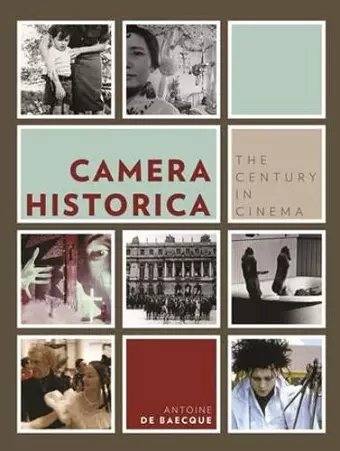Camera Historica
The Century in Cinema
Antoine de Baecque author Jonathan Magidoff translator Ninon Vinsonneau translator
Format:Hardback
Publisher:Columbia University Press
Published:9th Mar '12
Currently unavailable, and unfortunately no date known when it will be back

Antoine de Baecque is one of the most interesting and original historians writing today, as fluent in historical method as he is in semiotics and film history. This book is breathtaking in its scope, remarkable in its command of multiple cinematic traditions, and complex and thought-provoking in its arguments. The book ranges widely, treating everything from Chaplin films to middle-brow historical epics, from the politics of the French New Wave to the newest wave of Russian films made after the fall of Communism. The field of cinema and history is just opening up. No book has taken on as many different aspects of the relationship with such aplomb, verve, and insight. A landmark in the field. -- Vanessa Schwartz, author of It's So French! Hollywood, Paris, and the Making of Cosmopolitan Film Culture
Antoine de Baecque proposes a new historiography of cinema, exploring film as a visual archive of the twentieth century, as well as history's imprint on the cinematic image. Whether portraying events that occurred in the past or stories unfolding before their eyes, certain twentieth-century filmmakers used a particular mise-en-scene to give form to history, becoming in the process historians themselves. Historical events, in turn, irrupted into cinema. This double movement, which de Baecque terms the "cinematographic form of history," disrupts the very material of film, much like historical events disturb the narrative of human progress. De Baecque defines, locates, and interprets cinematographic forms in seven distinct bodies of cinema: 1950s modern cinema and its conjuring of the morbid trauma of war; French New Wave and its style, which became the negative imprint of the malaise felt by young contemporaries of the Algerian War; post-Communist Russian films, or the "de-modern" works of catastroika; contemporary Hollywood films that attach themselves to the master fiction of 9/11; the characteristic mise en forme of filmmaker Sacha Guitry, who, in Si Versailles m'etait conte (1954), filmed French history from inside its chateau; the work of Jean-Luc Godard, who evoked history through his own museum memory of the twentieth century; and the achievements of Peter Watkins, the British filmmaker who reported on history like a war correspondent. De Baecque's introduction clearly lays out his theoretical framework, a profoundly brilliant conceptualization of the many ways cinema and history relate.
De Baecque is one of our most meticulous and enterprising film historians, and in Camera Historica, he finds a new way of looking at the two sides of his interest, film and history, making each a clarifying reflection of the other. As a particular bonus, he's especially good on important filmmakers who emerged during the 1960s, such as the Nouvelle Vague and Peter Watkins. -- Jonathan Rosenbaum, film critic Camera Historica marks a new stage in thinking about the relationship between cinema (as art) and history (as both real and narrative). Going beyond the classic 'histories of cinema,' this book reveals what cinema makes of history, its way of making history visible, and of allowing us to judge it. -- Alain Badiou Thanks to this book I now understand precisely why and how I am goth. -- Tim Burton Those in search of superb academic writing need look no further. De Baecque renders a beguiling mix of auteurism, rigorous methodology, and historical analysis in an evenhanded, engaging tone. -- Jonathan Robbins Film Comment Cinema and history are in lively dialogue here, which creates much more exciting reading...highly recommended. Choice Politics, social insights and film art blend in a scholarly international probe perfect for film analysts studying the art and culture of cinema. Midwest Book Review presents an intelligent, opinionated, emotionally engaging, intermittently flawed meditation on cinema's ongoing negotiations with history... -- David Sterritt Cineaste Camera Historica is a refreshing and stimulating read, ultimately offering a vital contribution to the ongoing need for serious discussions of the intersections between film and history. -- Paula Amad American Historical Review
ISBN: 9780231156509
Dimensions: unknown
Weight: unknown
424 pages